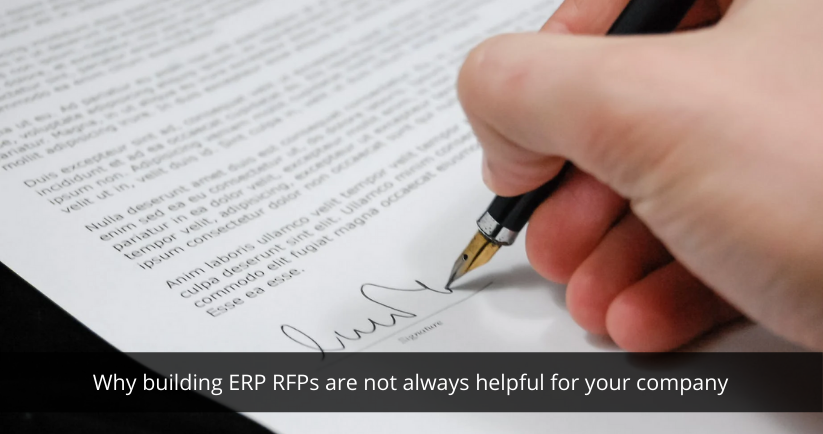RFP for ERPs is an essential document that mentions the company’s ERP requirements to vendors, but overly complicated RFPs can create troubles.
RFP stands for Request For Proposal. It’s a document that states the features the company needs in the Enterprise Resource Planning (ERP) software. RFP should be short and crisp and only stick to its intended purpose. But sometimes, it gets carried away with unnecessary details. Almost all ERP vendors set a certain threshold for the size of RFPs and don’t consider documents that are longer than it. So you must stick to the RFP size mentioned by the ERP vendor.
An important point to note is that all companies don’t have similar requirements. Multinational corporate houses that have branches spread across the globe conduct multiple business processes and have longer RFPs. But small and medium businesses don’t require the same level of detail. They must create RFPs that are only a few pages in length.
This article will give critical reasons why ERP RFPs are not always helpful for your company.
1. RFPs can become too specific.
RFPs can sometimes become too specific about the software applications that the company requires.
Consider the following two cases.
Case 1: The ERP software should collect, analyze, and provide critical customer information based on factual data.
Case 2: The ERP software should have a “customer review screen” that provides the following information about the customer:
a. Needs, wants, desires, and ambitions
b. Past purchasing pattern
c. Buying habits
d. Credit limit
e. Past sales history
f. Contact information
g. Geographic details
h. Demographic details
i. Psychographic details
j. Behavioral details
Can you see the difference?
The first case provides a general problem statement. On the contrary, the second case offers too many specific details regarding how the ERP software should function. Companies should give specific details later, for example, during the demo stage, when other details have been finalized. It’s because each ERP software is unique and functions differently.
In short, the RFP must shed light on business requirements instead of software requirements.
Also Read: Customer Segmentation in CRM
2. RFPs can set unrealistic expectations.
One of the most significant drawbacks of RFPs is that it sets unrealistic expectations. Sometimes companies demand substantial functionalities at a minimal price. If you do so, your RFP will get rejected by most ERP vendors. So research well before sending the RFPs. A good practice is to mention prices (in figures) against each ERP module.
For example:
| Module | Expected Price |
| Supply Chain management | USD X |
| Sales and Marketing | USD Y |
| Human Resource Management | USD Z |
| Finance and accounting | USD A |
Such tables make it easy for ERP vendors to determine what functionalities companies need and gauge their budget.
3. Sending RFPs to numerous vendors.
Many companies send their RFPs to numerous vendors, let’s say more than 30, simultaneously. Suppose you get a response from 15 vendors who quote their prices and are ready to deliberate further. Would you be able to communicate with all 15 of them?
No.
It’s advised that companies must do market research before sending their RFPs. It makes it easy to select only those vendors that provide top-notch ERP systems within the company’s budget.
Experts suggest that companies send RFPs to not more than 5 or 6 ERP vendors because even if 2 or 3 vendors are shortlisted, it’s convenient to deal with them simultaneously.
Conclusion
We have seen all the problems associated with ERP RFPs. Many experts suggest that companies shouldn’t draft RFPs. Instead, they should prepare a shortlist of the functionalities they require in the ERP software and discuss with ERP vendors on a case-to-case basis. Ultimately, it depends on which path you want to take, but if you decide to prepare an RFP, you must keep the points we have discussed in this article.
At Sage Software Solutions (P) Ltd., we are home to world-class ERP software and CRM software that will solidify your business tech support fundamentals and enable you to build a customer-centric organization. To know more about it, You can also write to us at sales@sagesoftware.co.in
Disclaimer: All the information, views, and opinions expressed in this blog are those of the authors and their respective web sources and in no way reflect the principles, views, or objectives of Sage Software Solutions (P) Ltd.




